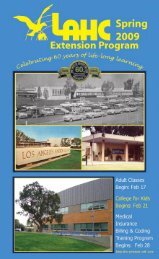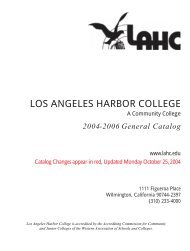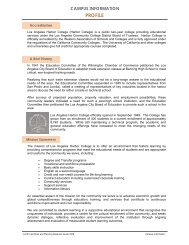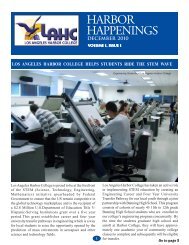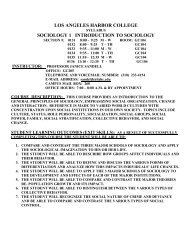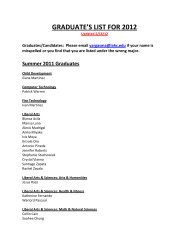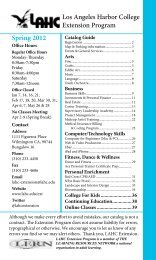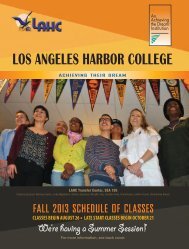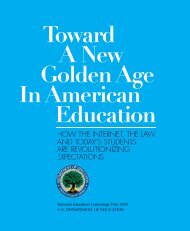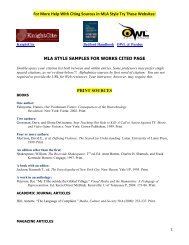Download File - Los Angeles Harbor College
Download File - Los Angeles Harbor College
Download File - Los Angeles Harbor College
Create successful ePaper yourself
Turn your PDF publications into a flip-book with our unique Google optimized e-Paper software.
Q & A’S ABOUT COLLEGE PROGRAMS<br />
Frequently Asked Questions by All Students<br />
1. What type of goal may I pursue at <strong>Harbor</strong> <strong>College</strong>?<br />
<strong>Harbor</strong> <strong>College</strong> provides a number of options for community college<br />
students:<br />
• Obtaining an A.A. or A.S. degree from the college<br />
• Obtaining a certificate of competence in a vocational area.<br />
• Preparing to transfer to a university.<br />
• Taking courses to enhance or learn a skill.<br />
• Taking courses for personal interest.<br />
2. What if I am undecided about my goals?<br />
You should discuss your educational and career plans with a counselor.<br />
Our Career Center can help you determine which aptitudes might<br />
lead you into a successful field of employment. A counselor can help<br />
you choose courses which will prepare you for a variety of options.<br />
3. What is the difference between the Associate in Arts<br />
and the Associate in Science degree?<br />
The college offers AA and AS degrees for both transfer and non<br />
transfer students. In order to understand them, let’s take them in order:<br />
Degrees for students who wish to transfer: The college offers a<br />
Liberal Arts and Sciences degree, which, when completed along with<br />
major requirements, allows for transfer. In order to choose the option<br />
which is best for you, it is important to see a counselor.<br />
Degrees for students who do not wish to transfer: In most<br />
occupational areas, the Associate in Science degree can be earned in<br />
a specific occupational field. Students can also earn a Liberal Arts<br />
Associate in Arts non transfer degree. This is typically chosen by<br />
students who want to increase their breadth of knowledge, for personal<br />
interest or for job advancement.<br />
4. How long may I take to complete a college program?<br />
If you are not receiving financial aid or veterans benefits, there is no<br />
time limit for degree or certificate requirements. If you are receiving<br />
financial aid…<br />
Won’t the requirements change if I take a long time to finish a<br />
degree or certificate?<br />
If you are continuously enrolled, the requirements stated in the<br />
catalog during the year you begin will remain applicable throughout<br />
your stay at <strong>Harbor</strong> <strong>College</strong>.<br />
Frequently Asked Questions by Transfer Students<br />
1. If I obtain a degree from <strong>Harbor</strong>, am I automatically<br />
ready to transfer to a university?<br />
Not necessarily. You must follow your major and general education<br />
requirements for the university of your choice. A counselor can<br />
help you choose between following the CSU General Education<br />
Requirement, the UC Breadth Requirements, or the Intersegmental<br />
General Education Transfer Curriculum (IGETC) requirements,<br />
which allow you to transfer to either the UC or CSU systems. Private<br />
colleges have individual general education articulation agreements<br />
with <strong>Harbor</strong> <strong>College</strong>; a counselor can help you interpret the necessary<br />
coursework for any private college. The important thing to remember<br />
is that you must see a counselor early in your college career, so that<br />
you can make the most informed choices.<br />
2. What is meant by General Education coursework?<br />
General Education courses are a range of core subjects which focus<br />
upon critical thinking, reading and writing, analysis, criticism and<br />
synthesis of information. They provide the broad base of knowledge<br />
which provides a foundation of learning outside your major area of<br />
study. For a list of general education options, consult the contents of<br />
the catalog and see a counselor for clarification.<br />
3. What is meant by General Education certification?<br />
There are two types of General Education certification:<br />
1. All CSU’s require a common pattern of 39 units. <strong>Harbor</strong><br />
<strong>College</strong> will certify your completion. CSU will honor this<br />
certification; that is they will not require additional courses<br />
in lower division General Education after transferring.<br />
Completion of general education requirements is not necessarily<br />
a requirement for university admission; students can often finish<br />
general education requirements at the university level after<br />
transfer. If possible, however, completing all general education<br />
courses at <strong>Harbor</strong> is strongly advised<br />
2. All CSU’s and UC’s participate in the IGETC (Intersegmental<br />
General Education Transfer Curriculum). This package allows a<br />
student to take a core group of general education transfer courses<br />
which, in combination with completion of courses required<br />
in preparation for a major, will allow transfer to any CSU or<br />
UC campus. If you choose this option, you must complete the<br />
general education coursework, and be fully certified by <strong>Harbor</strong><br />
<strong>College</strong>, before transferring. Partial certification is allowed only<br />
with prior approval and for a specific hardship that occurred in<br />
the final term before transfer.<br />
2012-2014 General Catalog Degree and Certifi cate Programs * 51



